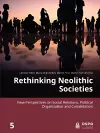
Rethinking Neolithic Societies
4 contributors - Paperback
£45.00
Martin Furholt is Professor at the Institute of Archaeology, Conservation and History at the University of Oslo, Norway. Before he was working as Research Fellow and Lecturer at the CAU Kiel. His main research interests are the social and political organisation, mobility and community composition, local and regional social networks of Neolithic and Bronze Age communities in Southeast Europe, Central Europe, and Northern Europe. He conducted his Phd research on Baden Complex materials in Poland and Czech Republic, and his Habilitation thesis on the Neolithic and Chalkolithic of the Aegean Region. He is currently conducting fieldwork on 6th millennium Neolithic settlement in Slovakia and Serbia, and publishes papers related to the ongoing 3rd millennium migration debate in Europe. Key publications Martin Furholt, Massive migrations? The impact of recent aDNA studies on our view of third millennium Europe. European Journal of Archaeology 21, 2, 2018, 159-191. Martin Furholt, Translocal Communities – Exploring Mobility and Migration of Sedentary Societies in the European Neolithic and Early Bronze Age. Prähistorische Zeitschrift 92, 2, 2018, 304–321. Martin Furholt, Upending a ‘Totality’: Re-evaluating Corded Ware Variability in Late Neolithic Europe. Proceedings of the Prehistoric Society 80, 2014, 67 – 86. Ivan Cheben is a Researcher at the Archaeological Institute of the Slovak Academy of Sciences in Nitra. His main research interests are material culture studies and settlement patterns of Neolithic and Copper Age periods in Central Europe. He has an extensive experience in archaeological fieldwork in Slovakia, and served as the head of rescue excavations in SW Slovakia for many years. Since 2012 he is head of the Vráble fieldwork project. Johannes Müller (PhD, University of Freiburg, 1990) is a Professor and Director of the Institute for Prehistoric and Protohistoric Archaeology at Kiel University, Germany. He is the founding director of the Johanna Mestorf Academy, Speaker of the Collaborative Research Centre “Scales of Transformation: Human-environmental Interaction in Prehistoric and Archaic Societies” and of the Excellence Cluster “ROOTS – Social, Environmental, and Cultural Connectivity in Past Societies”. He conducts research on Neolithic and Bronze Age Europe, including the challenge of interlinking natural, social, life sciences, and the humanities within an anthropological approach of archaeology. Intensive fieldwork was and is carried out in international teams, e.g., on Tripolye mega-sites in Eastern Europa, the Late Neolithic tell site of Okolište in Bosnia-Hercegovina, different Neolithic domestic and burial sites in Northern Germany, and Early Bronze Age sites in Greater Poland. Ethnoarchaeological fieldwork has been conducted, e.g., in India. Within the Kiel Graduate School “Human Development in Landscapes”, now the Young Academy of ROOTS, and the Scandinavian Graduate School “Dialogues of the Past”, Johannes Müller promotes international PhD projects. Alena Bistáková is Researcher at the Archaeological Institute of the Slovak Academy of Sciences in Nitra. Her main interests are material culture studies, settlement structures and burial rite of Neolithic and Copper Age periods in Central Europe. She has conducted archaeological fieldwork in Slovakia. She has worked on projects in Central Europe, covering the Neolithic to the Bronze Age and archaeological practices and knowledge work in the digital environment. She is part of the Vráble project since 2018. Maria Wunderlich is currently a Lecturer and Research Fellow at the Institute of Pre- and Protohistoric Archaeology, Kiel University. She has obtained her Master of Arts in 2014 in Kiel, her Master thesis being awarded the archaeology award of the Archaeological Society Schleswig-Holstein. For her PhD-studies between 2014 and 2018 she was involved in the DFG-project “Equality and Inequality: Social Differentiation in Northern Central Europe 4300-2400 BC” as a research assistant. For her comparative thesis on “Megalithic monuments and social structures” she conducted ethnoarchaeological field work in Sumba, Indonesia, and Nagaland, North-East India. Being interested in social archaeology and comparative analyses, she combines different theoretical approaches with material data derived both in recent and archaeological contexts. She obtained her doctoral degree (Dr. phil) in 2018.